简爱与呼啸山庄讲稿
- 格式:pptx
- 大小:182.69 KB
- 文档页数:25
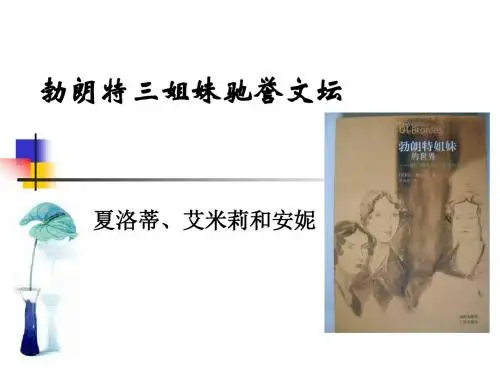
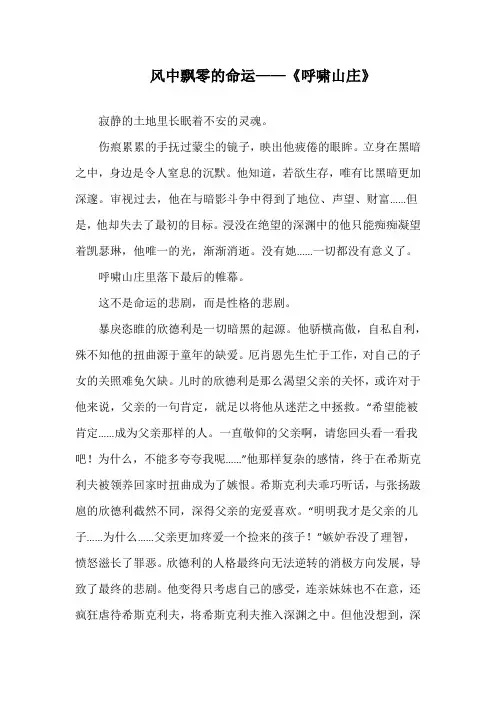
风中飘零的命运——《呼啸山庄》寂静的土地里长眠着不安的灵魂。
伤痕累累的手抚过蒙尘的镜子,映出他疲倦的眼眸。
立身在黑暗之中,身边是令人窒息的沉默。
他知道,若欲生存,唯有比黑暗更加深邃。
审视过去,他在与暗影斗争中得到了地位、声望、财富……但是,他却失去了最初的目标。
浸没在绝望的深渊中的他只能痴痴凝望着凯瑟琳,他唯一的光,渐渐消逝。
没有她……一切都没有意义了。
呼啸山庄里落下最后的帷幕。
这不是命运的悲剧,而是性格的悲剧。
暴戾恣睢的欣德利是一切暗黑的起源。
他骄横高傲,自私自利,殊不知他的扭曲源于童年的缺爱。
厄肖恩先生忙于工作,对自己的子女的关照难免欠缺。
儿时的欣德利是那么渴望父亲的关怀,或许对于他来说,父亲的一句肯定,就足以将他从迷茫之中拯救。
“希望能被肯定……成为父亲那样的人。
一直敬仰的父亲啊,请您回头看一看我吧!为什么,不能多夸夸我呢……”他那样复杂的感情,终于在希斯克利夫被领养回家时扭曲成为了嫉恨。
希斯克利夫乖巧听话,与张扬跋扈的欣德利截然不同,深得父亲的宠爱喜欢。
“明明我才是父亲的儿子……为什么……父亲更加疼爱一个捡来的孩子!”嫉妒吞没了理智,愤怒滋长了罪恶。
欣德利的人格最终向无法逆转的消极方向发展,导致了最终的悲剧。
他变得只考虑自己的感受,连亲妹妹也不在意,还疯狂虐待希斯克利夫,将希斯克利夫推入深渊之中。
但他没想到,深渊里最后会爬出来一个复仇怪物。
全书最核心的角色应属希斯克利夫了。
他的复仇之火燃烧了整本书,让人为他的诡谲多变心思细腻暗暗捏汗。
他是黑暗之子,深沉顿郁的眼眸似笑非笑,像毒蛇的信子,让不敢直视。
但是他并非一开始就是如此。
养父过世以后,一直承受着欣德利的压迫,让他不禁为自己感到悲哀与不平。
少年应该拥有的活力无忧的青春,他没有。
他只有被当做佣人呼来喝去的回忆。
他或许也尝试过无视他,尝试过原谅他,但是他不是神,也不是圣人,终无法宽恕一个毫无悔意的罪人。
欣德利的百般刁难,让他忍无可忍。
“我也是人,也有自己的情感,也有追求平等的权利,凭什么只有我要被折磨与伤害!”以牙还牙,以眼还眼。
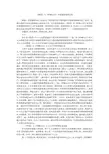
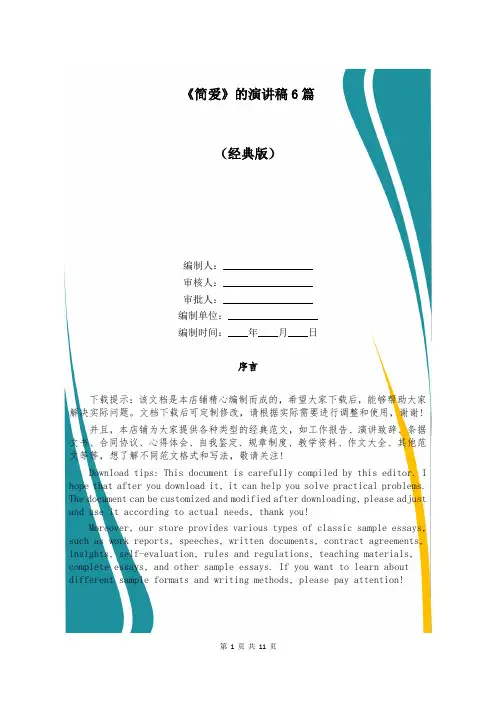
《简爱》的演讲稿6篇(经典版)编制人:__________________审核人:__________________审批人:__________________编制单位:__________________编制时间:____年____月____日序言下载提示:该文档是本店铺精心编制而成的,希望大家下载后,能够帮助大家解决实际问题。
文档下载后可定制修改,请根据实际需要进行调整和使用,谢谢!并且,本店铺为大家提供各种类型的经典范文,如工作报告、演讲致辞、条据文书、合同协议、心得体会、自我鉴定、规章制度、教学资料、作文大全、其他范文等等,想了解不同范文格式和写法,敬请关注!Download tips: This document is carefully compiled by this editor. I hope that after you download it, it can help you solve practical problems. The document can be customized and modified after downloading, please adjust and use it according to actual needs, thank you!Moreover, our store provides various types of classic sample essays, such as work reports, speeches, written documents, contract agreements, insights, self-evaluation, rules and regulations, teaching materials, complete essays, and other sample essays. If you want to learn about different sample formats and writing methods, please pay attention!《简爱》的演讲稿6篇演讲者通过演讲稿展现的语言机智,是吸引听众关注的重要契机,演讲稿是演讲者与听众沟通的纽带,有助于建立更紧密的联系,使演讲更具人文关怀,本店铺今天就为您带来了《简爱》的演讲稿6篇,相信一定会对你有所帮助。
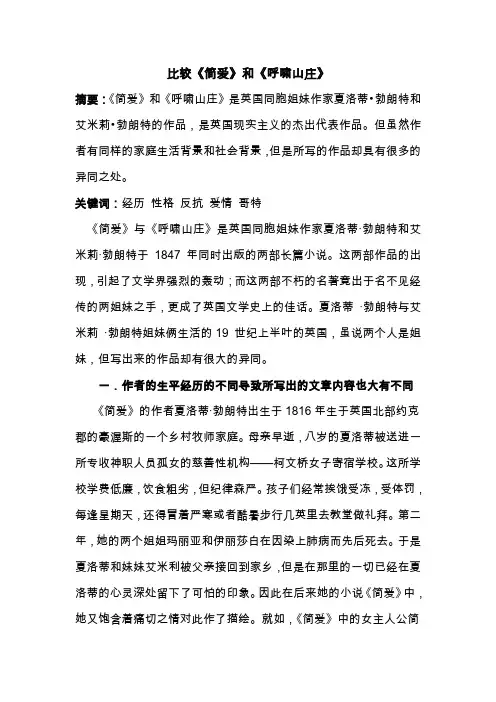
比较《简爱》和《呼啸山庄》摘要:《简爱》和《呼啸山庄》是英国同胞姐妹作家夏洛蒂•勃朗特和艾米莉•勃朗特的作品,是英国现实主义的杰出代表作品。
但虽然作者有同样的家庭生活背景和社会背景,但是所写的作品却具有很多的异同之处。
关键词:经历性格反抗爱情哥特《简爱》与《呼啸山庄》是英国同胞姐妹作家夏洛蒂·勃朗特和艾米莉·勃朗特于1847年同时出版的两部长篇小说。
这两部作品的出现,引起了文学界强烈的轰动;而这两部不朽的名著竟出于名不见经传的两姐妹之手,更成了英国文学史上的佳话。
夏洛蒂·勃朗特与艾米莉·勃朗特姐妹俩生活的19 世纪上半叶的英国,虽说两个人是姐妹,但写出来的作品却有很大的异同。
一.作者的生平经历的不同导致所写出的文章内容也大有不同《简爱》的作者夏洛蒂·勃朗特出生于1816年生于英国北部约克郡的豪渥斯的一个乡村牧师家庭。
母亲早逝,八岁的夏洛蒂被送进一所专收神职人员孤女的慈善性机构——柯文桥女子寄宿学校。
这所学校学费低廉,饮食粗劣,但纪律森严。
孩子们经常挨饿受冻,受体罚,每逢星期天,还得冒着严寒或者酷暑步行几英里去教堂做礼拜。
第二年,她的两个姐姐玛丽亚和伊丽莎白在因染上肺病而先后死去。
于是夏洛蒂和妹妹艾米利被父亲接回到家乡,但是在那里的一切已经在夏洛蒂的心灵深处留下了可怕的印象。
因此在后来她的小说《简爱》中,她又饱含着痛切之情对此作了描绘。
就如,《简爱》中的女主人公简爱在里德太太家,面对舅母、表兄妹的歧视和虐待,已经表现出强烈的反抗精神。
当她的表兄殴打她时,她勇于回击;当舅母嚷着叫自己的孩子远离她时,她高喊“他们不配和我在一起”;当她被囚禁在空房中时,想到自己所受到的虐待,从内心发出了“不公正”的呐喊。
在孤儿院,简的反抗性格更为鲜明,对冷酷的校长和摧残她们的教师深恶痛绝。
她对海伦说:“假如她用那根条子打我,我要从她手里把它夺过来,并且当面折断它。
”而小说中可爱的小姑娘海伦的形象,也是以她的姐姐玛丽亚为原型的。
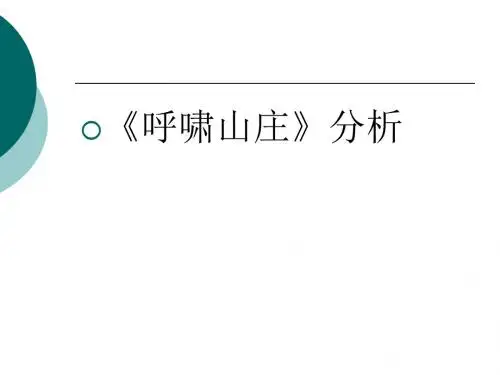
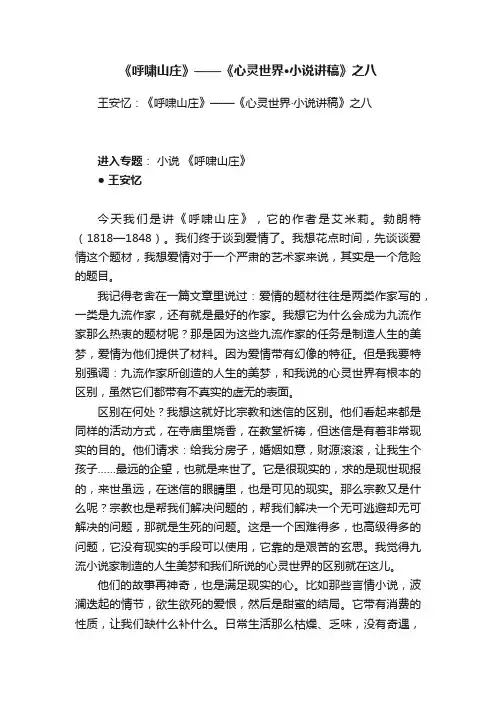
《呼啸山庄》——《心灵世界·小说讲稿》之八王安忆:《呼啸山庄》——《心灵世界·小说讲稿》之八进入专题:小说《呼啸山庄》● 王安忆今天我们是讲《呼啸山庄》,它的作者是艾米莉。
勃朗特(1818—1848)。
我们终于谈到爱情了。
我想花点时间,先谈谈爱情这个题材,我想爱情对于一个严肃的艺术家来说,其实是一个危险的题目。
我记得老舍在一篇文章里说过:爱情的题材往往是两类作家写的,一类是九流作家,还有就是最好的作家。
我想它为什么会成为九流作家那么热衷的题材呢?那是因为这些九流作家的任务是制造人生的美梦,爱情为他们提供了材料。
因为爱情带有幻像的特征。
但是我要特别强调:九流作家所创造的人生的美梦,和我说的心灵世界有根本的区别,虽然它们都带有不真实的虚无的表面。
区别在何处?我想这就好比宗教和迷信的区别。
他们看起来都是同样的活动方式,在寺庙里烧香,在教堂祈祷,但迷信是有着非常现实的目的。
他们请求:给我分房子,婚姻如意,财源滚滚,让我生个孩子……最远的企望,也就是来世了。
它是很现实的,求的是现世现报的,来世虽远,在迷信的眼睛里,也是可见的现实。
那么宗教又是什么呢?宗教也是帮我们解决问题的,帮我们解决一个无可逃避却无可解决的问题,那就是生死的问题。
这是一个困难得多,也高级得多的问题,它没有现实的手段可以使用,它靠的是艰苦的玄思。
我觉得九流小说家制造的人生美梦和我们所说的心灵世界的区别就在这儿。
他们的故事再神奇,也是满足现实的心。
比如那些言情小说,波澜迭起的情节,欲生欲死的爱恨,然后是甜蜜的结局。
它带有消费的性质,让我们缺什么补什么。
日常生活那么枯燥、乏味,没有奇遇,那么在小说里面做做梦,补偿一下现实的缺陷。
而真正的心灵世界它解决不了任何问题,手头的问题它一个也解决不了,它告诉你根本看不见的东西,这东面需要你付出思想和灵魂的劳动去获取,然后它会照亮你的生命,永远照亮你的生命。
话再说回去,爱情,因其幻像的特质,确是给制造美梦的作家提供了非常现成的材料。
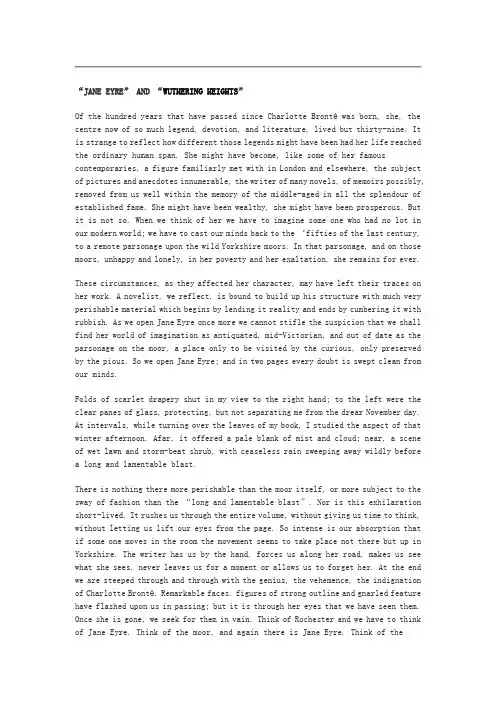
“JANE EYRE” AND “WUTHERING HEIGHTS”Of the hundred years that have passed since Charlotte Brontė was born, she, the centre now of so much legend, devotion, and literature, lived but thirty-nine. It is strange to reflect how different those legends might have been had her life reached the ordinary human span. She might have become, like some of her famous contemporaries, a figure familiarly met with in London and elsewhere, the subject of pictures and anecdotes innumerable, the writer of many novels, of memoirs possibly, removed from us well within the memory of the middle-aged in all the splendour of established fame. She might have been wealthy, she might have been prosperous. But it is not so. When we think of her we have to imagine some one who had no lot in our modern world; we have to cast our minds back to the ‘fifties of the last century, to a remote parsonage upon the wild Yorkshire moors. In that parsonage, and on those moors, unhappy and lonely, in her poverty and her exaltation, she remains for ever.These circumstances, as they affected her character, may have left their traces on her work. A novelist, we reflect, is bound to build up his structure with much very perishable material which begins by lending it reality and ends by cumbering it with rubbish. As we open Jane Eyre once more we cannot stifle the suspicion that we shall find her world of imagination as antiquated, mid-Victorian, and out of date as the parsonage on the moor, a place only to be visited by the curious, only preserved by the pious. So we open Jane Eyre; and in two pages every doubt is swept clean from our minds.Folds of scarlet drapery shut in my view to the right hand; to the left were the clear panes of glass, protecting, but not separating me from the drear November day. At intervals, while turning over the leaves of my book, I studied the aspect of that winter afternoon. Afar, it offered a pale blank of mist and cloud; near, a scene of wet lawn and storm-beat shrub, with ceaseless rain sweeping away wildly before a long and lamentable blast.There is nothing there more perishable than the moor itself, or more subject to the sway of fashion than the “long and lamentable blast”. Nor is this exhilaration short-lived. It rushes us through the entire volume, without giving us time to think, without letting us lift our eyes from the page. So intense is our absorption that if some one moves in the room the movement seems to take place not there but up in Yorkshire. The writer has us by the hand, forces us along her road, makes us see what she sees, never leaves us for a moment or allows us to forget her. At the end we are steeped through and through with the genius, the vehemence, the indignation of Charlotte Brontė. Remarkable faces, figures of strong outline and gnarled feature have flashed upon us in passing; but it is through her eyes that we have seen them. Once she is gone, we seek for them in vain. Think of Rochester and we have to think of Jane Eyre. Think of the moor, and again there is Jane Eyre. Think of thedrawing-room,11even, those “white carpets on which seemed laid brilliant garlands of flowers”, that “pale Parian mantelpiece” with its Bohemia glass of “ruby red” and the “general blending of snow and fire”—what is all that except Jane Eyre?11 Charlotte and Emily Brontė had much the same sense of colour. “. . . we saw —ah! it was beautiful—a splendid place carpeted with crimson, and crimson-covered chairs and tables, and a pure white ceiling bordered by gold, a shower of glass drops hanging in silver chains from the centre, and shimmering with little soft tapers” (Wuthering Heights). “Yet it was merely a very pretty drawing-room, and within it a boudoir, both spread with white carpets, on which seemed laid brilliant garlands of flowers; both ceiled with snowy mouldings of white grapes and vine leaves, beneath which glowed in rich contrast crimson couches and ottomans; while the ornaments on the pale Parian mantelpiece were of sparkling Bohemia glass, ruby red; and between the windows large mirrors repeated the general blending of snow and fire” (Jane Eyre).The drawbacks of being Jane Eyre are not far to seek. Always to be a governess and always to be in love is a serious limitation in a world which is full, after all, of people who are neither one nor the other. The characters of a Jane Austen or of a Tolstoi have a million facets compared with these. They live and are complex by means of their effect upon many different people who serve to mirror them in the round. They move hither and thither whether their creators watch them or not, and the world in which they live seems to us an independent world which we can visit, now that they have created it, by ourselves. Thomas Hardy is more akin to Charlotte Brontė in the power of his personality and the narrowness of his vision. But the differences are vast. As we read Jude the Obscure we are not rushed to a finish; we brood and ponder and drift away from the text in plethoric trains of thought which build up round the characters an atmosphere of question and suggestion of which they are themselves, as often as not, unconscious. Simple peasants as they are, we are forced to confront them with destinies and questionings of the hugest import, so that often it seems as if the most important characters in a Hardy novel are those which have no names. Of this power, of this speculative curiosity, Charlotte Bront ė has no trace. She does not attempt to solve the problems of human life; she is even unaware that such problems exist; all her force, and it is the more tremendous for being constricted, goes into the assertion, “I love”, “I hate”, “I suffer”.For the self-centred and self-limited writers have a power denied the more catholic and broad-minded. Their impressions are close packed and strongly stamped between their narrow walls. Nothing issues from their minds which has not been marked with their own impress. They learn little from other writers, and what they adopt they cannot assimilate. Both Hardy and Charlotte Brontė appear to have founded their styles upon a stiff and decorous journalism. The staple of their prose is awkward and unyielding. But both with labour and the most obstinate integrity, by thinking every thought until it has subdued words to itself, have forged for themselves a prose which takes the mould of their minds entire; which has, into the bargain, abeauty, a power, a swiftness of its own. Charlotte Brontė, at least, owed nothing to the reading of many books. She never learnt the smoothness of the professional writer, or acquired his ability to stuff and sway his language as he chooses. “I could never rest in communication with strong, discreet, and refined minds, whether male or female”, she writes, as any leader-writer in a provincial journal might have written; but gathering fire and speed goes on in her own authentic voice “till I had passed the outworks of conventional reserve and crossed the threshold of confidence, and won a place by their hearts’ very hearthstone”. It is there that she takes he r seat; it is the red and fitful glow of the heart’s fire which illumines her page. In other words, we read Charlotte Brontė not for exquisite observation of character—her characters are vigorous and elementary; not for comedy—hers is grim and crude; not for a philosophic view of life—hers is that of a country parson’s daughter; but for her poetry. Probably that is so with all writers who have, as she has, an overpowering personality, so that, as we say in real life, they have only to open the door to make themselves felt. There is in them some untamed ferocity perpetually at war with the accepted order of things which makes them desire to create instantly rather than to observe patiently. This very ardour, rejecting half shades and other minor impediments, wings its way past the daily conduct of ordinary people and allies itself with their more inarticulate passions. It makes them poets, or, if they choose to write in prose, intolerant of its restrictions. Hence it is that both Emily and Charlotte are always invoking the help of nature. They both feel the need of some more powerful symbol of the vast and slumbering passions in human nature than words or actions can convey. It is with a description of a storm that Charlotte ends her finest novel Villette. “The skies hang full and dark—a wrack sails from the west; the clouds cast themselves into strange forms.” So she calls in nature to describe a state of mind which could not otherwise be expressed. But neither of the sisters observed nature accurately as Dorothy Wordsworth observed it, or painted it minutely as Tennyson painted it. They seized those aspects of the earth which were most akin to what they themselves felt or imputed to their characters, and so their storms, their moors, their lovely spaces of summer weather are not ornaments applied to decorate a dull page or display the writer’s powers of observation—they carry on the emotion and light up the meaning of the book.The meaning of a book, which lies so often apart from what happens and what is said and consists rather in some connection which things in themselves different have had for the writer, is necessarily hard to grasp. Especially this is so when, like the Brontės, the writer is poetic, and his meaning inseparable from his language, and itself rather a mood than a particular observation. Wuthering Heights is a more difficult book to understand than Jane Eyre, because Emily was a greater poet than Charlotte. When Charlotte wrote she said with eloquence and splendour and passion “I love”, “I hate”, “I suffer”. Her experience, though more intense, is on a level with our own. But there is no “I” in Wuthering Heights. There are no governesses. There are no employers. There is love, but it is not the love of menand women. Emily was inspired by some more general conception. The impulse which urged her to create was not her own suffering or her own injuries. She looked out upon a world cleft into gigantic disorder and felt within her the power to unite it in a book. That gigantic ambition is to be felt throughout the novel—a struggle, half thwarted but of superb conviction, to say something through the mouths of her characters which is not merely “I love” or “I hate”, but “we, the whole human race” and “you, the eternal powers . . .” the sentence remains unfinished. It is not strange that it should be so; rather it is astonishing that she can make us feel what she had it in her to say at all. It surges up in the half-articulate words of Catherine Earnshaw, “If all else perished and HE remained, I should still continue to be; and if all else remained and he were annihilated, the universe would turn to a mighty stranger; I should not seem part of it”. It breaks out again in the presence of the dead. “I see a repose that neither earth nor hell can break, and I feel an assurance of the endless and shadowless hereafter—the eternity they have entered—where life is boundless in its duration, and love in its sympathy and joy in its fulness.” It is this suggestion of power underlying the apparitions of human nature and lifting them up into the presence of greatness that gives the book its huge stature among other novels. But it was not enough for Emily Brontė to write a few lyrics, to utter a cry, to express a creed. In her poems she did this once and for all, and her poems will perhaps outlast her novel. But she was novelist as well as poet. She must take upon herself a more laborious and a more ungrateful task. She must face the fact of other existences, grapple with the mechanism of external things, build up, in recognisable shape, farms and houses and report the speeches of men and women who existed independently of herself. And so we reach these summits of emotion not by rant or rhapsody but by hearing a girl sing old songs to herself as she rocks in the branches of a tree; by watching the moor sheep crop the turf; by listening to the soft wind breathing through the grass. The life at the farm with all its absurdities and its improbability is laid open to us. We are given every opportunity of comparing Wuthering Heights with a real farm and Heathcliff with a real man. How, we are allowed to ask, can there be truth or insight or the finer shades of emotion in men and women who so little resemble what we have seen ourselves? But even as we ask it we see in Heathcliff the brother that a sister of genius might have seen; he is impossible we say, but nevertheless no boy in literature has a more vivid existence than his. So it is with the two Catherines; never could women feel as they do or act in their manner, we say. All the same, they are the most lovable women in English fiction. It is as if she could tear up all that we know human beings by, and fill these unrecognisable transparences with such a gust of life that they transcend reality. Hers, then, is the rarest of all powers. She could free life from its dependence on facts; with a few touches indicate the spirit of a face so that it needs no body; by speaking of the moor make the wind blow and the thunder roar.。
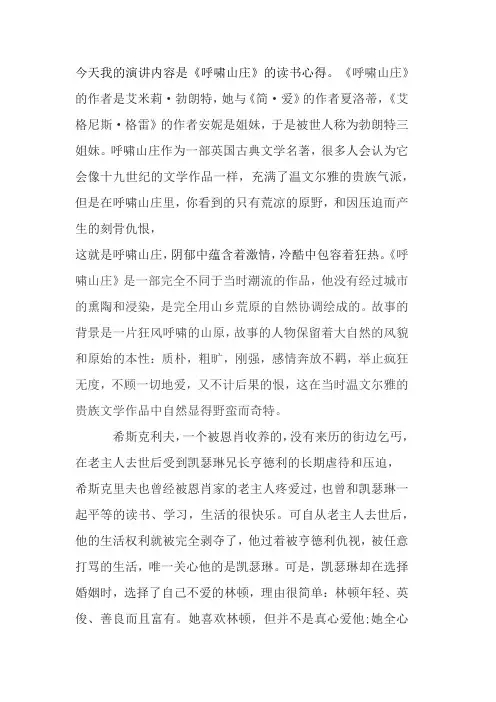
今天我的演讲内容是《呼啸山庄》的读书心得。
《呼啸山庄》的作者是艾米莉·勃朗特,她与《简·爱》的作者夏洛蒂,《艾格尼斯·格雷》的作者安妮是姐妹,于是被世人称为勃朗特三姐妹。
呼啸山庄作为一部英国古典文学名著,很多人会认为它会像十九世纪的文学作品一样,充满了温文尔雅的贵族气派,但是在呼啸山庄里,你看到的只有荒凉的原野,和因压迫而产生的刻骨仇恨,这就是呼啸山庄,阴郁中蕴含着激情,冷酷中包容着狂热。
《呼啸山庄》是一部完全不同于当时潮流的作品,他没有经过城市的熏陶和浸染,是完全用山乡荒原的自然协调绘成的。
故事的背景是一片狂风呼啸的山原,故事的人物保留着大自然的风貌和原始的本性:质朴,粗旷,刚强,感情奔放不羁,举止疯狂无度,不顾一切地爱,又不计后果的恨,这在当时温文尔雅的贵族文学作品中自然显得野蛮而奇特。
希斯克利夫,一个被恩肖收养的,没有来历的街边乞丐,在老主人去世后受到凯瑟琳兄长亨德利的长期虐待和压迫,希斯克里夫也曾经被恩肖家的老主人疼爱过,也曾和凯瑟琳一起平等的读书、学习,生活的很快乐。
可自从老主人去世后,他的生活权利就被完全剥夺了,他过着被亨德利仇视,被任意打骂的生活,唯一关心他的是凯瑟琳。
可是,凯瑟琳却在选择婚姻时,选择了自己不爱的林顿,理由很简单:林顿年轻、英俊、善良而且富有。
她喜欢林顿,但并不是真心爱他;她全心全意爱着希斯克里夫,但却无法降低身份忍受贫穷。
最后在那个夜晚,克里夫离开了这个伤心之地。
当三年后希斯克里夫气度不凡的回到呼啸山庄时,带着的是刻骨仇恨和处心积虑的复仇计划。
他不惜一切代价来抢夺财产,他想办法把小凯瑟琳与艾伦留在呼啸山庄,并且逼小凯瑟琳与他自幼体弱多病的儿子结婚,在林顿死后,希斯克利夫也想尽办法把画眉山庄据为己有,希斯克里夫终于完成了从人到魔鬼的蜕变,完成了人性的彻底扭曲和堕落,在寂寞与空虚中等待着死亡。
呼啸山庄,其实是一个成长的故事。
作者认为成长本身,就意味着放弃纯美的童年,和对成人世界的妥协。
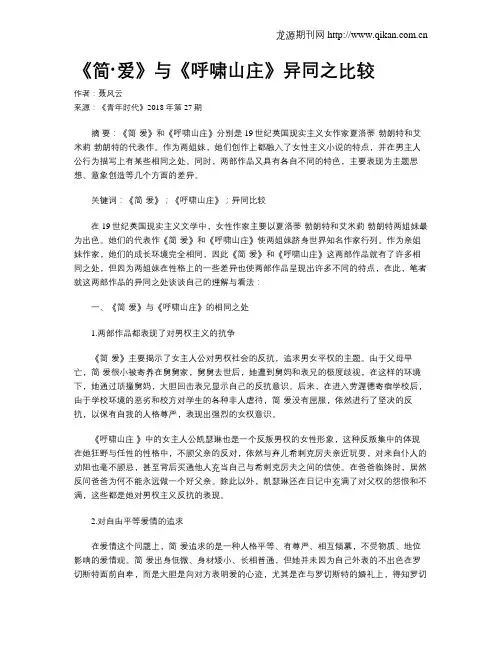
《简·爱》与《呼啸山庄》异同之比较作者:聂风云来源:《青年时代》2018年第27期摘要:《简·爱》和《呼啸山庄》分别是19世纪英国现实主义女作家夏洛蒂·勃朗特和艾米莉·勃朗特的代表作。
作为两姐妹,她们创作上都融入了女性主义小说的特点,并在男主人公行为描写上有某些相同之处。
同时,两部作品又具有各自不同的特色,主要表现为主题思想、意象创造等几个方面的差异。
关键词:《简·爱》;《呼啸山庄》;异同比较在19世纪英国现实主义文学中,女性作家主要以夏洛蒂·勃朗特和艾米莉·勃朗特两姐妹最为出色。
她们的代表作《简·爱》和《呼啸山庄》使两姐妹跻身世界知名作家行列。
作为亲姐妹作家,她们的成长环境完全相同,因此《简·爱》和《呼啸山庄》这两部作品就有了许多相同之处,但因为两姐妹在性格上的一些差异也使两部作品呈现出许多不同的特点,在此,笔者就这两部作品的异同之处谈谈自己的理解与看法:一、《简·爱》与《呼啸山庄》的相同之处1.两部作品都表现了对男权主义的抗争《简·爱》主要揭示了女主人公对男权社会的反抗,追求男女平权的主题。
由于父母早亡,简·爱很小被寄养在舅舅家,舅舅去世后,她遭到舅妈和表兄的极度歧视,在这样的环境下,她通过顶撞舅妈,大胆回击表兄显示自己的反抗意识。
后来,在进入劳渥德寄宿学校后,由于学校环境的恶劣和校方对学生的各种非人虐待,简·爱没有屈服,依然进行了坚决的反抗,以保有自我的人格尊严,表现出强烈的女权意识。
《呼啸山庄》中的女主人公凯瑟琳也是一个反叛男权的女性形象,这种反叛集中的体现在她狂野与任性的性格中,不顾父亲的反对,依然与弃儿希刺克厉夫亲近玩耍,对来自仆人的劝阻也毫不顾忌,甚至背后买通他人充当自己与希刺克厉夫之间的信使。
在爸爸临终时,居然反问爸爸为何不能永远做一个好父亲。
除此以外,凯瑟琳还在日记中充满了对父权的怨恨和不满,这些都是她对男权主义反抗的表现。
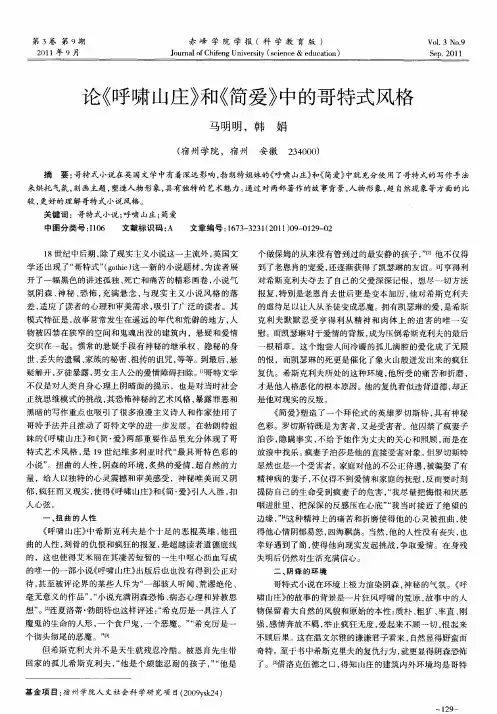
阅读赏析《简爱与呼啸山庄》本节目将阅读英国女作家弗吉尼亚·伍尔夫的文章——《简爱与呼啸山庄》,本作品是一篇充满对勃朗特姐妹缅怀之情的作品。
作者系出名门,才华横溢,气质非凡。
她在书香的浸染中成长,在挚爱她的亲朋中生活。
欣赏她的作品,细心体会她那细腻而又不乏激情的文笔。
作者介绍:弗吉尼亚·伍尔夫(1882—1941)是个多才多艺的小说家、文学评论家,现代西方女性主义的先驱者。
年轻时便已成为英国伦敦布伦兹伯利文艺圈中的主将,深受弗洛伊德心理学、女性主义及同性恋运动影响。
1917年与其夫莱昂纳德·伍尔夫创立英国霍加斯出版社,陆续出版当时重要文人的作品。
在20世纪的女性作家中,想忽略她是不可能的。
她以一部《一间自己的房间》唱响女权主义的号角,以《到灯塔去》、《波浪》等作品扯起意识流的旗帜,她在20世纪西方文学中的位置无人替代。
然而上帝偏又把一种可怕的精神疾病抛给她,纠缠了她一生。
最后这个聪明绝顶的女人终于无法再容忍自己的这份不完美,投河自尽了。
《简爱与呼啸山庄》原文:夏洛蒂.勃朗特诞生至今已有一百年之久,现在她已成为那么多传奇、爱戴和文学的中心,然而,在这一百年中,她只不过活了三十九年。
要是她能活到普通人的寿命,那么关于她的那些传奇将会大不相同,此事想来真是不可思议。
她或许会象她同时代的某些名人那样,成为人们在伦敦或别处经常遇见的人物,成为无数画面和轶事的主题,成为许多小说(也可能是回忆录)的作者,当她离去之时,我们沉浸在对于她中年时期显赫声誉的回忆之中。
她或许会生活富裕,一帆风顺。
然而,事实并非如此。
当我们想起她时,我们不能不想起在我们现代世界中时运不济的某一个人;我们不得不回顾前一世纪五十年代,想起荒野的约克郡沼泽地带一所遥远的教区牧师住宅。
在那教区牧师的住宅里,在那荒野的沼泽地带,她不幸而又孤独,永远处于贫困和精神奋发的状态之中。
1996年版电影《简爱》这些情况既然影响了她的性格,很可能在她的作品中也留下了它们的痕迹。
名著阅读《简爱》演讲稿500字__简爱小说演讲稿五篇我喜欢读《简爱》,因为书没读到一半,我就被主人公简爱的矢志不渝的精神和平凡人身上少有的一种人格魅力深深地吸引了。
下面小编给大家介绍关于名著阅读《简爱》演讲稿的内容,方便大家一起学习。
更多关于简爱的相关内容推荐↓↓↓名著阅读《简爱》演讲稿1简放弃了唾手可得的幸福,因为尊严。
于是她落难在沼泽居。
可即使是在这里,她仍然没有忘记自己的定位,她没有什么人人平等的思想。
农夫的孩子就是农夫的,无论她们表现得多么优秀,她们都只能是所有农夫中最出色的,她们永远不可能达到她自己的地位,更不可能变成上等人。
在这里,她收到了一份求婚,这位有头脑,有理想的大好青年期望他们可以一起去实践他的理想。
可是,他并不爱简,仅仅因为合适而要求结婚。
简当然不会同意,因为她虽然落难,但仍然有着自己的尊严,更何况她的初恋并没有退去。
简收到了财产,也收到了罗切斯特的呼唤,于是她回到了桑德尔菲。
罗切斯特在之前的漫长的时间中没有呼唤过简吗?这显然是不可能的,可是简没有感应。
当她终于获得了足够的资金让她成为一个上等人的时候,她听到了罗切斯特的呼唤,因为这个时候的简的心结已经打开了,她的尊严已经有了坚强的后盾,她不再可能是一个情妇了,所以她回去了。
当他们结婚以后,简说过,尤其让她愉悦的是罗切斯特可以毫不犹豫地依赖她而没有丝毫的愧疚或者说感激。
这句话当然从一方面说明了他们的感情,而更让简感到高兴的是其中传达的平等的意味——只有在充分尊重一个人的基础上才能达成这样的感情。
名著阅读《简爱》演讲稿2《简爱》一书有着其乐融融的蛇足结尾:若干年后,罗切斯特的一只眼睛恢复了光明,他们有了自己的儿子,过着知足而满足的生活。
小说告诉我们人的最美好的生活是人的尊严加爱。
简爱自始至终她一直坚持自己的信念,执着自己的理想和追求,尊严和爱是她生活的支柱。
简爱的一生平凡而不平庸,她就像一个充满智慧、充满爱心并努力使自己生命得到最大张扬的精灵。
呼啸山庄讲稿[小编推荐]第一篇:呼啸山庄讲稿[小编推荐]呼啸山庄各位同学:大家好!今天我给大家讲的是《呼啸山庄》,这部小说很多同学都看过,前面也有一些同学也讲了《呼啸山庄》,我今天主要从作品赏析和人物性格分析这两方面来讲。
一、作者简介(略)二、写作背景(略)三、故事梗概(略)四、人物分析 1)Cathrine从作品中不难看出,她是个渴望自由,无拘无束,但是复杂且难以琢磨的人物。
孤独,强烈渴望爱。
(童年的她不讨父母的喜欢,所以她渴望亲人的爱;和Heathcliff相爱之后,经常陷入神智错乱中,特别是他离开她之后,更是绝望而孤独)虚荣,虚伪。
(想要得带Edgar的爱很大程度上是出于虚荣心;在她的眼里,要得到尊重就是要有钱有地位,所以在呼啸山庄里的她狂野,但在外人面前却把自己伪装成高雅的淑女。
)无拘无束,奔放热情。
(“她的情绪总是处于兴奋期”“在狂风呼啸的荒原里,他们俩一起嬉戏,一起疯狂”。
封闭的呼啸山庄让她的性情得到了最大限度的发挥,呼啸山庄是她自由的天堂。
)倔强叛逆。
(她不喜欢娃娃,以骑马为乐;她试图用她的叛逆和倔强来引起父母的注意和关爱,这是孩子自然地天性;老恩肖的放纵让她更加任性;对待Nelly的态度也充分显示了她傲慢任性的小姐本色)Cathrine 性格形成的原因内部原因:①在呼啸山庄里压抑,放纵②生性好强,对名利地位的追求③内心深处的孤独寂寞外部环境:①无拘无束的大自然(狂风怒吼,风雪肆虐等等)② 人为因素(Heathcliff对她的影响;整个社会的价值取向;Edgar对她的宠爱、鄙视;Hindley暴虐性格的影响)2)Heathcliff 关于Heathcliff 的性格分析Ⅰ.Heathcliff是一个渴望爱(亲情,爱情)的人。
Ⅱ.但实际上他的所作所为却是如此地悲剧,发人深省。
①他爱他的养父(养父是他的恩人,只有在养父这里,他才能感受到亲情的快乐。
)②他爱Cathrine(这是他一生中最大的爱,她是他生命中唯一的希望。
《简爱》演讲稿范文《简爱》演讲稿篇一:《简爱》读后感演讲稿大概很多人都会有一个疑问,文中描绘过简爱的健康状况:瘦巴巴、病恹恹,然而她却在那种衣食简陋的情况下活了下来。
简在义塾中是怎样令自己摆脱悲痛的包袱?这个悲痛包括了她受到的肉体折磨与精神折磨。
肉体折磨是指简在义塾里衣着单薄,四季都是如此,凛冬之时整天都会瑟瑟发抖。
而一天三餐更是难以充饥,以至于用餐时众人都会争抢彼此的食物。
与宋濂学士从师时一日两餐,无肥美之享,足肤皲裂倒颇为相似。
就像孟子说的那样:天降大任于斯人也,必先苦其心志,劳其筋骨,饿其体肤。
而精神折磨指的是遇到的艰难险阻。
虽然她有海伦做她的知己和精神上的引路人,谭波尔小姐是她的良师益友,但总体来说简还是一个相当独立的人,她对朋友没有任何依赖心理。
固然海伦的去世给她带来前所未有的悲痛,谭波尔小姐的离去使她产生无言的失落,但这些困扰她的时间都很短暂。
内心无比强大的力量使她很快回归生活正轨,而只把这两件事视作回忆中两朵珍贵的花。
简是一个非常坚忍,内在力量极强的女孩,我们也要像她一样永远准备好要开始奋斗,抗争,克服一切遇到的艰难险阻,顽强地,有尊严地活下去。
《简爱》演讲稿篇二:我最爱的一本书演讲稿尊敬的老师..亲爱的同学们:大家好!我们都知道,读书是一种享受,也是快乐的,捧起它,它是圣洁的;翻开它,它是万能的;阅读它,它是美妙的。
从小时候起,我就和书结下了不解之缘。
我阅读的课外书很多,比如《同步作文》、《安徒生童话》、《三国演义》、《杨家将》、《简爱》、《鲁滨逊漂流记》、《风雪下的对峙》等……但我最喜欢的就是《鲁滨逊漂流记》了,因为我被主人公坚强的信念所感动。
今天,我就给在座的各位老师、同学们简单的讲一讲吧!文中的主人公因为自己航海的梦想失事落在了海岛之上,从此在荒无人烟的岛上进行了30年的不可想象的坚强抗争,最终获救。
如果换作不坚强的人,可能早就丢掉了性命。
为什么呢?因为他们没有探索精神,没有探索,天天空想自己会有奇遇、天上会掉馅饼,过不了多长时间,他就会发现自己一无所获,最终会饿死或者被野兽吃掉。
简爱演讲稿尊敬的老师,亲爱的同学们:大家好!今天我非常荣幸能站在这里,向大家分享我对《简爱》这部小说的一些感悟和思考。
《简爱》是夏洛蒂·勃朗特的代表作之一,也是世界文学史上的经典之一。
这部小说以女主人公简·爱的成长历程为主线,讲述了她从孤儿院到成为独立自主的女性的故事。
简·爱在生活中经历了很多困难和挫折,但她始终保持着对自己的坚定和对生活的热爱。
她的坚韧和勇气给予了我们很多启发和感悟。
首先,简·爱教会了我们勇敢面对生活中的困难和挑战。
她在孤儿院和桑菲尔德庄园中遭受了很多不公平对待和苦难,但她从未放弃过自己的信念和尊严。
她用自己的努力和坚持,最终赢得了自由和幸福。
这告诉我们,无论遇到什么困难,我们都要勇敢地面对,相信自己,坚持不懈地追求自己的梦想。
其次,简·爱告诉我们要珍惜内心的善良和真诚。
在小说中,简·爱始终保持着对他人的善良和真诚,不因外在的困难和压力而改变自己的本性。
她的善良和真诚感染了身边的人,也给了她自己更多的力量和勇气。
这提醒我们,无论身处何种环境,我们都要保持内心的善良和真诚,用爱心和善意对待他人,这样才能获得真正的幸福和满足。
最后,简·爱给我们带来了对生活的深刻思考和启发。
她在小说中对自己的生活和命运进行了深刻的反思和探索,最终找到了自己的人生价值和意义。
她告诉我们,人生并不是一帆风顺,而是充满了各种挑战和选择,我们需要不断地思考和探索,找到属于自己的人生之路。
在今天这个充满挑战和机遇的时代,我们可以从《简爱》中学到很多东西。
让我们珍惜内心的善良和真诚,勇敢地面对生活中的困难和挑战,不断地思考和探索,找到属于自己的人生之路。
相信我,只要我们坚定信念,勇敢前行,我们一定能够实现自己的梦想,创造属于自己的精彩人生!谢谢大家!。
名著阅读《简爱》1分钟简短演讲稿大全《简爱》小说告诉我们人的最美好的生活是人的尊严加爱,相信大家读完后都会很有启发。
下面小编给大家介绍关于名著阅读《简爱》演讲稿的内容,方便大家一起学习。
名著阅读《简爱》演讲稿1这几天刚读完《简爱》,心中还沉浸在主人公简爱的世界里,不能自拔,也许还是因为不成熟,所以看得一知半解,不能了解简爱的心理,也许,简爱就是作者夏洛蒂勃朗特心中的自己吧。
我并不喜欢简爱这个人,她过于倔强,性格又很孤傲,而且又是个不善言谈的人,我最不喜欢她的结局,但我相信,她选择了一条自己所热爱的道路。
在生活中,我们每一个人都会遇到一件事情有两种甚至多种选择,这些选择将会决定我们的一生,这时,我们会像简爱一样,毅然决定过自己想要的生活吗?我虽然无法理解作者为什么这样写简爱的结局,但我相信,简爱很幸福。
过自己想要的生活吧!幸福,就足够了。
名著阅读《简爱》演讲稿2《简爱》是一本具有多年历史的文学著作。
至今已152年的历史了。
它的成功在于它详细的内容,精彩的片段。
在译序中,它还详细地介绍了《简爱》的作者一些背景故事。
从中我了解到了作者夏洛蒂。
勃郎特的许多事。
她出生在一个年经济困顿、多灾多难的家庭;居住在一个远离尘器的穷乡僻壤;生活在革命势头正健,国家由农民向工业国过渡,新兴资产阶级日益壮大的时代,这些都给她的小说创作上打上了可见的烙印。
可惜,上帝似乎毫不吝啬的塑造了这个天才们。
有似乎急不可耐伸出了毁灭之手。
这些才华横溢的儿女,都无一例外的先于父亲再人生的黄金时间离开了人间。
惜乎,勃郎特姐妹!《简爱》这本小说,主要通过简·爱与罗切斯特之间一波三折的爱情故事,塑造了一个出生低微、生活道路曲折,却始终坚持维护独立人格、追求个性自由、主张人生平等、不向人生低头的坚强女性。
简·爱生存在一个父母双亡,寄人篱下的环境。
从小就承受着与同龄人不一样的待遇:姨妈的嫌弃,表姐的蔑视,表哥的侮辱和毒打……然而,她并没有绝望,她并没有自我摧毁,并没有在侮辱中沉沦。